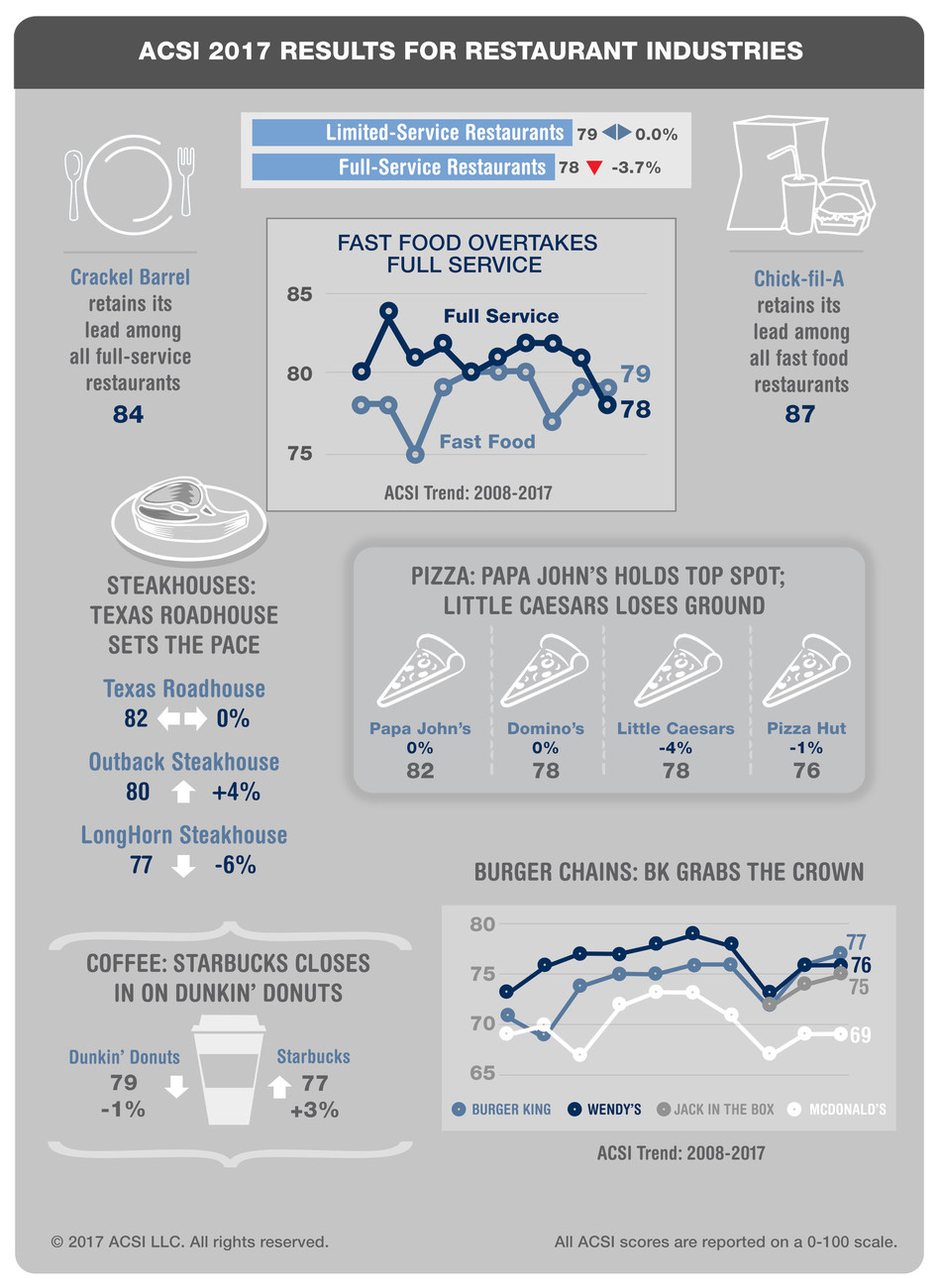Customer satisfaction with full-service restaurants is down 3.7 percent to a score of 78 (100-point scale) in a new report from the American Customer Satisfaction Index (ACSI). This is the lowest score in more than 10 years – and the first time that full-service restaurants have been beaten by the fast food category.
“Lower customer satisfaction is a major threat to the restaurant business,” says Claes Fornell, ACSI Chairman and founder. “Full-service restaurants cannot lose to fast food on quality and customer satisfaction because they can’t compete on price. If a lower-price competitor has higher customer satisfaction than a rival that competes on quality, the latter is obviously in serious trouble. Low price alone rarely leads to high levels of satisfaction, but high quality usually does.”
Menu prices are on the rise, but consumers don’t think full-service restaurant quality is currently good enough to justify higher prices. Same-store restaurant sales are down, and foot traffic is shrinking. Independent restaurants and smaller chains, which make up the majority of the industry, are down 4 percent to an aggregate score of 78.
Among the largest chains, restaurant-retail hybrid Cracker Barrel leads for the second year in a row (+1% to 84). Texas Roadhouse (unchanged at 82) is the top-scoring steakhouse, and its same-store sales outpaced many of its competitors in the first quarter. Outback Steakhouse comes in at 80 (+4%) and LongHorn Steakhouse at 77 (-6%).
In third place, Olive Garden is steady at 81 and ties with Red Lobster, which gains 3 percent in a second straight year of improvement. This year marks a four-year high for Red Lobster, which has invested in menu upgrades and higher-quality ingredients. Olive Garden continues to generate sales, benefiting from increases in its to-go business.
Applebee’s (79) and Ruby Tuesday (78) are unmoved, while Chili’s (+3% to 77) overtakes TGI Fridays (-3% to 76). As sales slump for the category, some chains are looking to redefine themselves, including rethinking locations and off-premise initiatives. Applebee’s introduced wood-fired grills, but this has not yet paid off in higher satisfaction or sales. Ruby Tuesday also stalls for ACSI amid store closings, and the company put itself up for sale in March.
Denny’s improves (+3% to 76), but Red Robin sinks to the bottom of the category (-9% to 73) as first quarter same-store sales drop 1.2 percent. Like major brick-and-mortar retailers, casual-dining chains like Red Robin have not been immune to an overall trend of declining foot traffic as consumers stay away from malls in greater numbers.
Meanwhile, customer satisfaction with fast food restaurants is stable at an ACSI score of 79. Better quality ingredients, speedy service and low prices are keeping customer satisfaction high. Chick-fil-A remains the leader (87), far ahead of KFC (78). In second place, Panera Bread is up 1 percent, tied with Papa John’s at 82 (unchanged) and the combined score of all other smaller chains and individual fast food restaurants (+1%).
Among pizza chains, Papa John’s maintains the lead, followed by Little Caesars (-4% to 78), Domino’s (unchanged at 78), and Pizza Hut (-1% to 76). Among sandwich makers, Panera Bread (+1% to 82) tops Subway (+1% to 81) and Arby’s (unchanged at 80).
Chipotle Mexican Grill stabilizes (+1% to 79) from a sharp drop a year ago, suggesting that the company is recovering from its 2015 food safety crisis. Same-store sales for Chipotle also rose in the first quarter. Taco Bell (+1%) scores 76, and Dunkin’ Donuts (-1% to 79) remains ahead of coffee rival Starbucks (+3% to 77).
Hamburger chains all fall below the industry average. After lagging Wendy’s for more than two decades, Burger King grabs the crown among burger chains with a 1 percent uptick to 77. Wendy’s (unchanged at 76) and Jack in the Box (+1% to 75) follow closely behind. Much lower, McDonald’s continues to occupy last place – flat at an ACSI score of 69.
The ACSI report, which is based on 5,557 customer surveys collected between June 8, 2016, and May 12, 2017, is available for free download at: http://www.theacsi.org/news-and-resources/customer-satisfaction-reports/reports-2017/acsi-restaurant-report-2017.
Follow the ACSI on Twitter at @theACSI and Like us on Facebook.
No advertising or other promotional use can be made of the data and information in this release without the express prior written consent of ACSI LLC.
About ACSI
The American Customer Satisfaction Index (ACSI) is a national economic indicator of customer evaluations of the quality of products and services available to household consumers in the United States. The ACSI uses data from interviews with roughly 180,000 customers annually as inputs to an econometric model for analyzing customer satisfaction with more than 300 companies in 43 industries and 10 economic sectors, including various services of federal and local government agencies.
ACSI results are released throughout the year, with all measures reported on a scale of 0 to 100. ACSI data have proven to be strongly related to several essential indicators of micro and macroeconomic performance. For example, firms with higher levels of customer satisfaction tend to have higher earnings and stock returns relative to competitors. Stock portfolios based on companies that show strong performance in ACSI deliver excess returns in up markets as well as down markets. At the macro level, customer satisfaction has been shown to be predictive of both consumer spending and GDP growth.
ACSI and its logo are Registered Marks of the University of Michigan, licensed worldwide exclusively to American Customer Satisfaction Index LLC with the right to sublicense.
SOURCE American Customer Satisfaction Index





